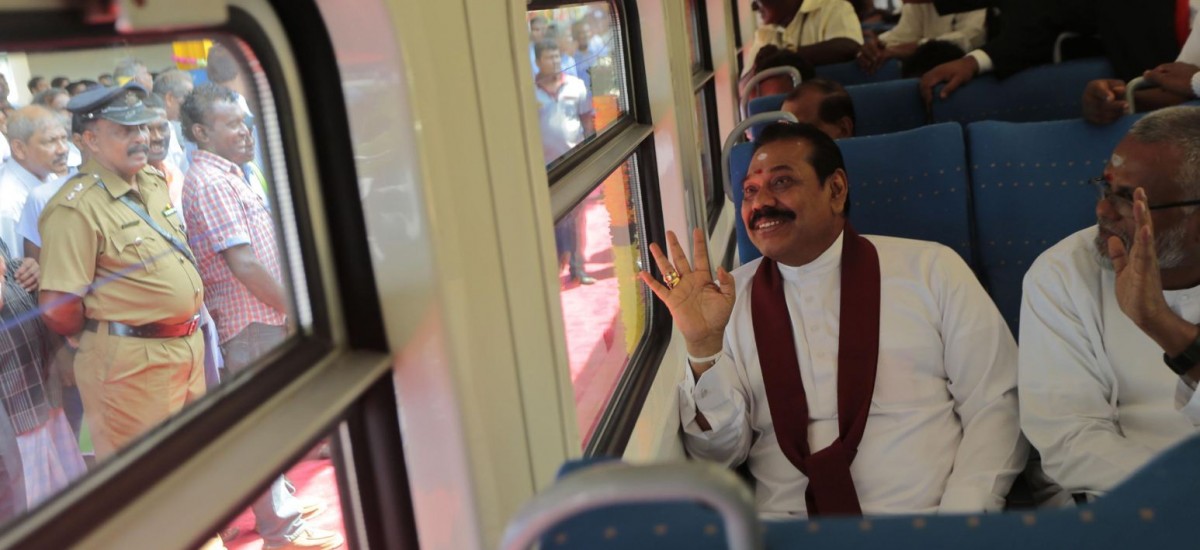Photo courtesy Yahoo
By all accounts, President Rajapakse’s unprecedented and rather controversial third term re-election campaign, though unofficial, has begun in earnest. Last week he presented the Cabinet of Ministers with a proposal to increase communal harmony in the country and implement the LLRC proposals, though a few weeks earlier the defense establishment, had facilitated a convention of an extremist religious organization, which joined hands with a convicted religious extremist monk from Myanmar to sprout the kind of vitriolic venom at minorities that most closely resembled the worst rhetoric of the Nazi political rallies in Nuremberg, Germany before the second world war. The hate speech charges of over breeding, controlling commerce, diluting the majority through inter marriage, were all charges leveled against the Jews by the Nazi’s. Today in Sri Lanka and indeed in Myanmar, eerily the same charges are leveled against the Muslim community by the self styled protectors of Buddhism, clearly more influenced by European fascism than by the great philosophy and noble teachings of South Asia’s greatest son.
This week, the president is on a visit to the North, where the best of the government’s reconstruction efforts were on display, the center piece being the resumption of the train services to Jaffna, the iconic Yaal Devi, resuming service after over two decades. The Government’s demining and infrastructure reconstruction efforts have been commendable and noteworthy successes. However in a damming indictment for the Rajapakse Administration, the Northern Provincial Council, led by Justice Wigneswaran, decided to boycott the president’s visit citing essentially the bad faith chocking of the provincial administration by the government at the center. The Rajapakse Administration having secured a dismal eighteen (18%) of the popular vote in the North, runs a parallel provincial administration in the north, through the governor, retired general Chandrasiri, who has in the best (or worst) traditions of military strongmen, shed their uniforms for civilian garb and run, a militarized parallel administration in the North. Furthermore even the very limited shared executive functions and powers devolved to the provinces and enjoyed by the other provincial councils are being denied to the Northern Provincial Council, the only ethnic minority and opposition controlled provincial administration in the country. A case in point being, the constitutional requirement that the appointment of the chief secretary by the President be done in consultation with the Chief Minster. It is a paradox of our constitution, that the actions of the president, cannot be challenged in a court of law or even raised in parliament and that there is complete immunity from judicial review. The legal limitations on this proviso made through case law, by the likes of late Justice Mark Fernando, have since been diluted and likely will no longer prevail post the impeachment of Chief Justice Shiranee Bandaranaike.
As the Rajapakse presidency seeks an unprecedented third term. It is time to take stock of the nature of Sri Lanka’s “peace”. Five years after the war has ended Sri Lanka still deploys the military countrywide through the public security ordinance, has detention without trial or due process under the PTA and has yet to adequately deal with the effects of the war on victims including families of the missing, war widows, war orphans, amputees and those rendered homeless and destitute by the near three decades of war. Impressive large scale infrastructure alone, has done little for victims. Not returning traditional lands in the Valigamam North areas of Jaffna to their owners, is now perpetuating impoverished internally displaced communities.
The government has done little by way of implementing the LLRC proposals for reconciliation. The government’s action plan on implementation of the LLRC, is a deeply flawed perversion of the actual LLRC report, in that it ignores the key political recommendations which underpin the overall LLRC recommendations, that of a political solution with the ethnic minorities and generally takes the approach that the problems identified by the LLRC don’t really exist. As Justice Wigneswaran the chief minister of the Northern Province has pointed out in his letter to the president, explaining the reasons for the boycott by the NPC, the repeated assurances to the international community to fully implement the 13th amendment to the Constitution, shown no signs of even commencing. On the contrary the central government through its bureaucracy is stifling even the limited devolution granted under the 13th amendments.
Several attempts by the South African to assist a process of national reconciliation through facilitating a direct dialogue between the government and the TNA as the overwhelmingly elected representatives of the Tamil people has been put on the back burner by the Government. The tired and rather hackneyed call by the government, for participation of the opposition parties in the government initiated Parliamentary Select Committee has been less frequent, as the government realizes the lack of credibility of parliamentary committees, given the farcical nature of the high profile, but allegedly deeply flawed process followed in the forcible removal of Chief Justice Bandaranaike.
Sri Lanka is in dire need of re-democratization. Our democratic issues took a severe beating and a consequent weakening due to and a through close upon three decades of war. However with the advent of peace or the absence of war, maintaining the same ethnic policies that were in place during the war, does nothing for reconciliation amongst Sri Lanka’s people, winning the hearts and minds of war affected communities or securing and making permanent through socio political acceptance, the hard won peace we have today.

